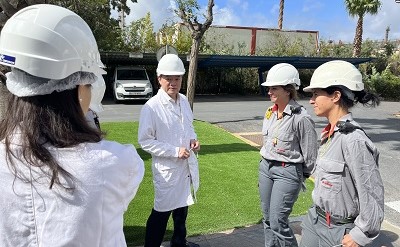- The president of CNAF, the largest state-owned supplier of aviation fuel in China, had the chance to get to know the units at La Rábida Energy Park
- Representatives from Airbus and Airbus China also participated in the visit
- The visit marks the first step towards a possible future collaboration
Sustainable aviation fuel, which is produced from agricultural waste, reduces carbon dioxide (CO2) emissions by up to 90% over the course of its life cycle. Since March of this year, Cepsa has begun to produce this type of fuel at La Rábida Energy Park. In addition, it is planning to build a new plant with an investment of one billion euros that will produce this sustainable kerosene from raw materials such as used cooking oil or agricultural waste. It is the largest second-generation biofuel plant in southern Europe and will be able to flexibly produce 500,000 tons per year of SAF and sustainable diesel from organic waste.
CNAF, China's state-owned company, is the country's largest supplier of aviation fuel. It covers 219 commercial airports in China, where it has its own fuel supply facilities, and extends the market to 48 more airports outside the Asian country. CNAF serves more than 300 airlines worldwide. Its interest in sustainable aviation fuel has led it, together with Airbus, to take an interest in Cepsa's production at its facilities at La Rábida Energy Park.
Airbus has had a presence in China since 1994. Since then, the European aircraft manufacturer's growth in the country has been exponential, significantly increasing the number of commercial aircraft sold in the last two decades.
This visit marks the first step towards a possible future collaboration. During the visit, Cepsa representatives were very satisfied with the impact that the work carried out in Huelva is having in the world of sustainable aviation.
Committing to SAF as a lever for decarbonizing the airline industry
As one of the main producers and suppliers of aviation fuels in the Spanish market, Cepsa works to be its customers’ best ally, working together to make progress on the energy transition and to help them achieve their decarbonization commitments, which it also shares. To this end, the company has set itself the objective of becoming the leading manufacturer of 2G biofuels in Spain and Portugal by the end of this decade. By 2030, the company will have an annual production capacity of 2.5 million tons of biofuels, 800,000 tons of which will be sustainable aviation fuel, enough to fly around the planet 2,000 times.
To date, Cepsa has signed partnerships for SAF research and production with leading airlines such as Binter, IAG Group (Iberia, Iberia Express, Air Nostrum and Vueling), Etihad, TUI, Wizz Air, and Volotea.
Since July 2023, Cepsa has sold SAF at four of Spain's main airports, which handle more than 133 million passengers each year, representing 55% of the country's passenger traffic. It is being sold at the airports of Madrid, Barcelona, Palma de Mallorca, and Seville to all customers who request it. Cepsa has thus become the first company to offer sustainable aviation fuel on a permanent basis at four of the main airports in Spain.



